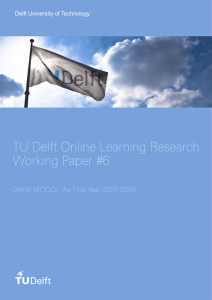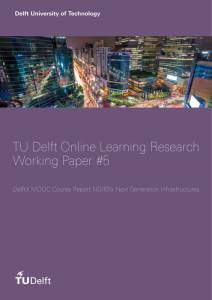Online Learning Research
SEFI2015: The Value of Engineering MOOCs from a Learner’s Perspective
This paper was presented at the 43rd Annual SEFI Conference June 29 – July 2, 2015 in Orléans, France
Abstract
This paper looks at the perceived value students adhere to the DelftX MOOC engineering courses they have taken, in other words what is the course worth in the context of their learning needs? Are you doing the course because you are curious, you want to get more knowledgeable on the topic, you need to know something related to your work, you do it for other professional reasons. This research will not cover all arguments as it is a first endeavor to get to know the learner better from the value perspective.
Paper
IJCLEE2015: Who is the Learner in the DelftX Engineering MOOCs?
This paper was presented at International Joint Conference on the Learner in Engineering Education (IJCLEE 2015) in San Sebastian.
Abstract
The Delft University of Technology (TUD) deployed her first generation of massive open online courses (MOOCs) in 2013-2014 delivered through the edX platform. These DelftX MOOCs were engineering courses designed at the level equivalent to that of a bachelor-program entry level. Almost 140 thousand students registered, around 3,7% received certificates of completion, and the rest participated to a degree reflective of their needs. To better understand and ultimately enhance the MOOCs, TUD conducted the collection and analysis of data about learners and their contexts. This exploratory paper focuses on the specific analyses pertinent to describing the demographics of an Engineering MOOC participant, as observed in the first generation of TUD MOOCs. The implications of the observed participant demographics are analysed and discussed.
Paper
Defining a Pedagogical Model: The TU Delft Online Learning Experience
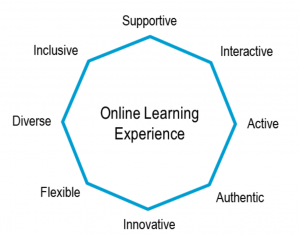 This paper was presented at the EDEN 2015 conference in Barcelona from 9-12 June 2015 by Nelson Jorge, Sofia Dopper and Willem van Valkenburg.
This paper was presented at the EDEN 2015 conference in Barcelona from 9-12 June 2015 by Nelson Jorge, Sofia Dopper and Willem van Valkenburg.
Abstract
In early 2014, the Delft University of Technology (TU Delft) started an innovation program with the aim to respond even more effectively to recent developments in open and online education. Drawing on the fields of Distance Education research and the university’s vision of the “engineer of the future”, TU Delft’s Extension School created a unified pedagogical model – the Online Learning Experience (OLE) – contributing to greater consistency in the development of online courses. Continue reading
Working Paper 4: Introduction to Credit Risk Management 2014
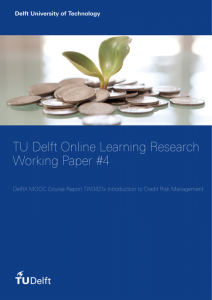 This report is to give more insight in the background, the implementation of the course and the results. The purpose is to provide useful information (and clean data) to the team of developers and teachers and to others to support their aspiration to improve online education. A comparative analysis of the first five DelftX MOOCs can be found in the ‘Working Paper DelftX MOOCs, the first year (2013-2014)’.
This report is to give more insight in the background, the implementation of the course and the results. The purpose is to provide useful information (and clean data) to the team of developers and teachers and to others to support their aspiration to improve online education. A comparative analysis of the first five DelftX MOOCs can be found in the ‘Working Paper DelftX MOOCs, the first year (2013-2014)’.
Working Paper 3: Introduction to Aeronautical Engineering 2014
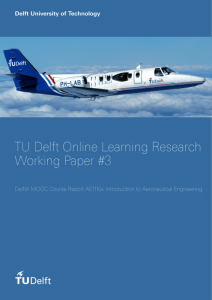 This report is to give more insight in the background, the implementation of the course and the results. The purpose is to provide useful information (and clean data) to the team of developers and teachers and to others to support their aspiration to improve online education. A comparative analysis of the first five DelftX MOOCs can be found in the ‘Working Paper DelftX MOOCs, the first year (2013-2014)’. Continue reading
This report is to give more insight in the background, the implementation of the course and the results. The purpose is to provide useful information (and clean data) to the team of developers and teachers and to others to support their aspiration to improve online education. A comparative analysis of the first five DelftX MOOCs can be found in the ‘Working Paper DelftX MOOCs, the first year (2013-2014)’. Continue reading
Working Paper 2: Introduction to Water Treatment 2013
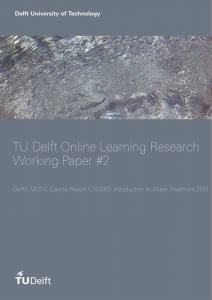 This report is to give more insight in the background, the implementation of the course and the results. The purpose is to provide useful information (and clean data) to the team of developers and teachers and to others to support their aspiration to improve online education. A comparative analysis of the first five DelftX MOOCs can be found in the ‘Working Paper DelftX MOOCs, the first year (2013-2014)’. Continue reading
This report is to give more insight in the background, the implementation of the course and the results. The purpose is to provide useful information (and clean data) to the team of developers and teachers and to others to support their aspiration to improve online education. A comparative analysis of the first five DelftX MOOCs can be found in the ‘Working Paper DelftX MOOCs, the first year (2013-2014)’. Continue reading
Working Paper 1: Solar Energy 2013
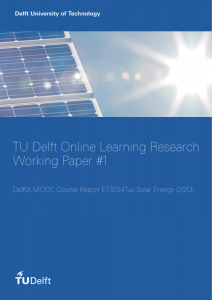 This report is to give more insight in the background, the implementation of the course and the results. The purpose is to provide useful information (and clean data) to the team of developers and teachers and to others to support their aspiration to improve online education. A comparative analysis of the first five DelftX MOOCs can be found in the ‘Working Paper DelftX MOOCs, the first year (2013-2014)’. Continue reading
This report is to give more insight in the background, the implementation of the course and the results. The purpose is to provide useful information (and clean data) to the team of developers and teachers and to others to support their aspiration to improve online education. A comparative analysis of the first five DelftX MOOCs can be found in the ‘Working Paper DelftX MOOCs, the first year (2013-2014)’. Continue reading
EMOOCs 2015: Experiences from 18 DelftX MOOCs
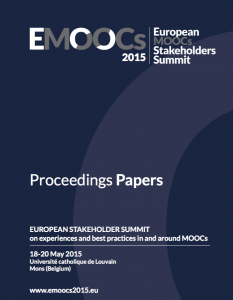 Paper presented at the European Stakeholders summit on experiences and best practices in and around MOOCs in Mons, Belgium (18-20 May 2015).
Paper presented at the European Stakeholders summit on experiences and best practices in and around MOOCs in Mons, Belgium (18-20 May 2015).
Abstract
This paper describes experiences and lessons learned from developing, building and running 18 MOOCs (including 4 reruns) at the Delft University of Technology, namely the selection of courses, the design, development and delivery of courses, innovative educational elements for use in online and in residential teaching, and the generation of data. Overall the development and offering of MOOCs has augmented the awareness, expertise, and innovation regarding online and residential learning, and has contributed to an active and positive spirit of educational innovation. In addition, we saw indications of a positive effect on quality and quantity of enrolment for on-campus programs, gathered data for research and were able to share the university’s knowledge with the world.
Reference
Kiers, J., Jorge, N., (2015). Experiences from 18 DelftX MOOCs in Proceedings Paper EMOOCs 2015 (page 65-70): http://www.emoocs2015.eu/sites/default/files/Papers.pdf

